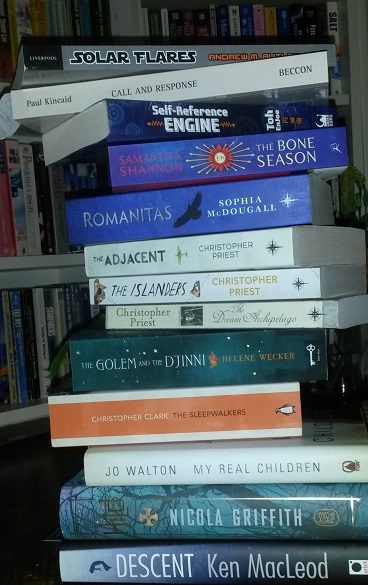I’ve been recording my monthly reading totals over at Wis[s]e Words since 2008, but only now thought of doing the same for the books I’ve reviewed here. Better late than never, eh?
This has been a pretty productive month, with ten books reviewed, including some that have been waiting a long time. But eight out of these ten are fantasy or science fiction, with one crime novel written by a science fiction author as well as a non-fiction book about steampunk. It’s a bit unbalanced, but then I do get the most feedback and views on these books, so there. With regards to gender, it’s perfectly balanced, with five books written by women and five by men, though this is completely coincidental.
Monument — Lloyd Biggle
Classic anti-colonialist science fiction.
The Blue Place — Nicola Griffith
An incredibly well written, gut wrenching hardboiled detective.
Half Life — SL Huang
A math savant sociopath learns to how to fake friendship until it becomes real, while trying to rescue a robot child from the company that owns it.
The Handmaid’s Tale — Margaret Atwood
Chillingly plausible Christian dystopia still relevant today.
The Nemesis from Terra — Leigh Brackett
Good old fashioned planetary romance of the kind that Brackett does best.
Who Fears Death — Nnedi Okorafor
A gritty fantasy revenge story set in far future Africa.
The Instrumentality of Mankind — Cordwainer Smith
A decent late seventies short story collection containing all of Smith’s stories not collected in earlier, better volumes.
Schismatrix Plus — Bruce Sterling
Next to Neuromancer the most influential cyberpunk book ever written.
Pandora’s Planet — Christopher Anvil
Light hearted libertarianesque fun about clever earthmen outwitting ponderous aliens — from the point of view of the aliens.
Steampunk — Paul Roland
Disappointing overview of the steampunk subculture.
